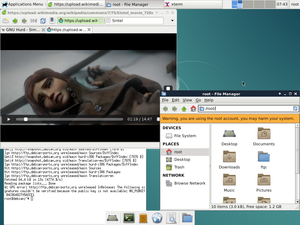GNU is a Unix-like operating system that comes with source code that can be copied, modified, and redistributed. The GNU project was started in 1983 by Richard Stallman and others, who formed the Free Software Foundation.
 | |
 | |
| Developer | Community |
|---|---|
| Written in | Various (notably C and assembly language) |
| OS family | Unix-like |
| Working state | Current |
| Source model | Free software |
| Latest preview | 0.401 (1 April 2011) [±] R |
| Marketing target | Personal computers, mobile devices, embedded devices, servers, mainframes, supercomputers |
| Platforms | IA-32 (with Hurd kernel only) and Alpha, ARC, ARM, AVR32, Blackfin, C6x, ETRAX CRIS, FR-V, H8/300, Hexagon, Itanium, M32R, m68k, META, MicroBlaze, MIPS, MN103, OpenRISC, PA-RISC, PowerPC, s390, S+core, SuperH, SPARC, TILE64, Unicore32, x86, Xtensa (with Linux-libre kernel only) |
| Kernel type | Microkernel (GNU Hurd) or Monolithic kernel (GNU Linux-libre, fork of Linux) |
| Userland | GNU |
| License | GNU GPL, GNU LGPL, GNU AGPL, GNU FDL, GNU FSDG |
| Official website | www |
GNU (/ɡnuː/ (![]() listen)) is an extensive collection of free software, which can be used as an operating system or can be used in parts with other operating systems. The use of the completed GNU tools led to the family of operating systems popularly known as Linux. Most of GNU is licensed under the GNU Project's own General Public License (GPL).
listen)) is an extensive collection of free software, which can be used as an operating system or can be used in parts with other operating systems. The use of the completed GNU tools led to the family of operating systems popularly known as Linux. Most of GNU is licensed under the GNU Project's own General Public License (GPL).

GNU is also the project within which the free software concept originated. Richard Stallman, the founder of the project, views GNU as a "technical means to a social end". Relatedly, Lawrence Lessig states in his introduction to the second edition of Stallman's book Free Software, Free Society that in it Stallman has written about "the social aspects of software and how Free Software can create community and social justice".


